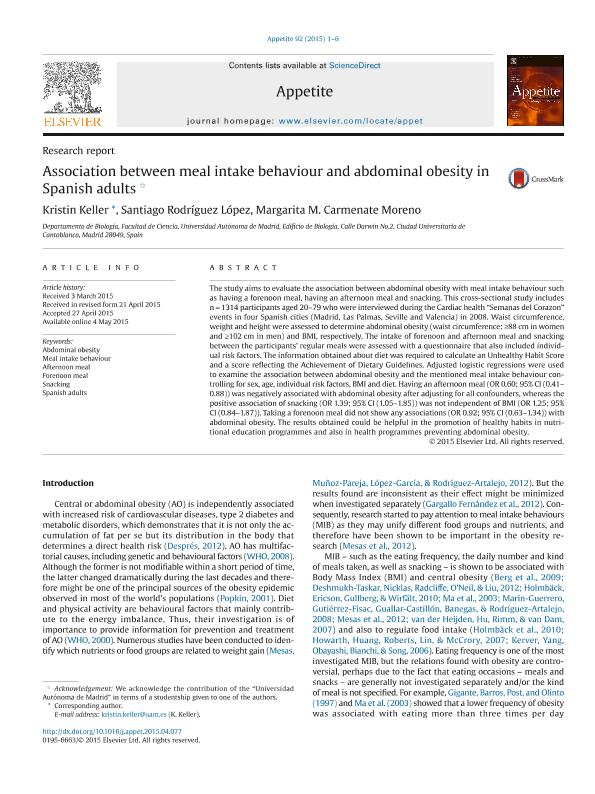Mostrar el registro sencillo del ítem
dc.contributor.author
Keller, Kristin
dc.contributor.author
Rodríguez López, Santiago

dc.contributor.author
Carmenate Moreno, Margarita M.
dc.date.available
2018-10-03T19:11:29Z
dc.date.issued
2015-09
dc.identifier.citation
Keller, Kristin; Rodríguez López, Santiago; Carmenate Moreno, Margarita M.; Association between meal intake behaviour and abdominal obesity in Spanish adults; Academic Press Ltd - Elsevier Science Ltd; Appetite; 92; 9-2015; 1-6
dc.identifier.issn
0195-6663
dc.identifier.uri
http://hdl.handle.net/11336/61603
dc.description.abstract
The study aims to evaluate the association between abdominal obesity with meal intake behaviour such as having a forenoon meal, having an afternoon meal and snacking. This cross-sectional study includes n=1314 participants aged 20-79 who were interviewed during the Cardiac health "Semanas del Corazon" events in four Spanish cities (Madrid, Las Palmas, Seville and Valencia) in 2008. Waist circumference, weight and height were assessed to determine abdominal obesity (waist circumference:≥88cm in women and ≥102cm in men) and BMI, respectively. The intake of forenoon and afternoon meal and snacking between the participants' regular meals were assessed with a questionnaire that also included individual risk factors. The information obtained about diet was required to calculate an Unhealthy Habit Score and a score reflecting the Achievement of Dietary Guidelines. Adjusted logistic regressions were used to examine the association between abdominal obesity and the mentioned meal intake behaviour controlling for sex, age, individual risk factors, BMI and diet. Having an afternoon meal (OR 0.60; 95% CI (0.41-0.88)) was negatively associated with abdominal obesity after adjusting for all confounders, whereas the positive association of snacking (OR 1.39; 95% CI (1.05-1.85)) was not independent of BMI (OR 1.25; 95% CI (0.84-1.87)). Taking a forenoon meal did not show any associations (OR 0.92; 95% CI (0.63-1.34)) with abdominal obesity. The results obtained could be helpful in the promotion of healthy habits in nutritional education programmes and also in health programmes preventing abdominal obesity.
dc.format
application/pdf
dc.language.iso
eng
dc.publisher
Academic Press Ltd - Elsevier Science Ltd

dc.rights
info:eu-repo/semantics/openAccess
dc.rights.uri
https://creativecommons.org/licenses/by-nc-sa/2.5/ar/
dc.subject
Abdominal Obesity
dc.subject
Afternoon Meal
dc.subject
Forenoon Meal
dc.subject
Meal Intake Behaviour
dc.subject
Snacking
dc.subject
Spanish Adults
dc.subject.classification
Salud Ocupacional

dc.subject.classification
Ciencias de la Salud

dc.subject.classification
CIENCIAS MÉDICAS Y DE LA SALUD

dc.title
Association between meal intake behaviour and abdominal obesity in Spanish adults
dc.type
info:eu-repo/semantics/article
dc.type
info:ar-repo/semantics/artículo
dc.type
info:eu-repo/semantics/publishedVersion
dc.date.updated
2018-09-24T14:31:13Z
dc.journal.volume
92
dc.journal.pagination
1-6
dc.journal.pais
Países Bajos

dc.journal.ciudad
Amsterdam
dc.description.fil
Fil: Keller, Kristin. Universidad Autónoma de Madrid; España
dc.description.fil
Fil: Rodríguez López, Santiago. Consejo Nacional de Investigaciones Científicas y Técnicas; Argentina. Universidad Autónoma de Madrid; España
dc.description.fil
Fil: Carmenate Moreno, Margarita M.. Universidad Autónoma de Madrid; España
dc.journal.title
Appetite

dc.relation.alternativeid
info:eu-repo/semantics/altIdentifier/doi/https://dx.doi.org/10.1016/j.appet.2015.04.077
dc.relation.alternativeid
info:eu-repo/semantics/altIdentifier/url/https://www.sciencedirect.com/science/article/pii/S0195666315002238
Archivos asociados
